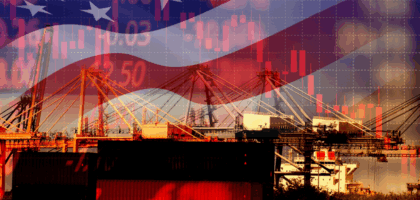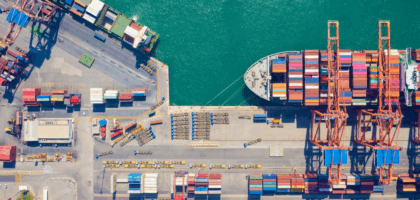Fear is pushing the U.S. Administration to issue policy changes, both in an attempt to secure imported and domestic supplies of personal protective equipment (PPE) and to stimulate an economy reeling from the domino effect of a global supply chain in crisis. This environment of speed and greed is fraught with those who would take advantage at the expense of others.
Background
This health crisis has led to a transportation crisis due to the interconnected nature of the global supply chain. As we saw during the ‘Great Recession’ of 2009, a shock that occurs in one of the supply chain’s sectors, or countries, is transmitted quickly to the other stages through both backward and forward linkages. In the decades before the Great Recession, “the world economy seemed to be on an irreversible course of ever-deepening globalization,” McKinsey analysts said. “Global trade expanded nearly eight-fold in the 1990s and 2000s and doubled as a share of GDP.” Then, in 2009, the volume of goods exported worldwide plunged 12 percent and services trade declined 9 percent, causing global GDP to drop 2 percent. Firms in all industries were required to deal with huge demand-supply mismatches caused by collapsing demand, according to supply chain specialists.
At the same time, “trade finance markets were subject to severe shortages,” wrote the WTO. Particularly for small businesses and developing countries, a persisting global trade finance shortfall remains estimated at $1.5 trillion. Recovering from that blow took the world economy nearly eight years. It may be, perhaps, a lingering fear that’s driving the knee-jerk reaction to this crisis.
Current Status
While the shock to the global supply chain is evident, beginning with the interruption in production in China during the New Year and quarantines, the administration’s reaction has been two-fold.
- Financial stimulus is being pumped into the economy to offset the effects of the shock; and
- Regulations surrounding the importation and production of personal protective equipment have been eased.
Both actions are leading to abuse. More than 15,000 Americans have already reported alleged coronavirus-related frauds totaling nearly $12 million in losses, according to new data released by the Federal Trade Commission last week. Fraudsters are setting up websites, contacting people by phone and email, and posting disinformation on social media platforms as a ruse to obtain money and personal information.
While the need for personal protective equipment is real, products that do not provide adequate protection are shipping along with legitimate products. The Dutch government has ordered a recall of around 600,000 masks out of a shipment of 1.3 million from China after they failed to meet quality standards. An inspection revealed that the FFP2 masks did not protect the face properly or had defective filter membranes. The fine filters stop the virus from entering the mouth or nose. The masks failed more than one inspection.
China is trying to rein in its subpar PPE manufacturers. Authorities have detained dozens of counterfeiters and threatened those producing poor quality medical products with life imprisonment. Beijing has also tightened export standards in recent days, including quality checks at customs and requiring domestic certification, as well as foreign licenses for medical products shipped abroad. Previously, exported medical products only had to have the certifications in receiving countries, such as the European Union’s CE certification, which could be easily counterfeited in China. But the desperation of states, nations, hospitals and individuals competing worldwide, shelling out millions of dollars to get medical gear as people die by the thousands each day, has created a scammer’s paradise. China is worried about low-quality medical products damaging its image. On April 6, customs authorities announced they’d confiscated more than 11 million unregistered medical products within one week, including 9.94 million masks, 144,000 protective gowns, 24,000 infrared thermometers, and more than a million testing kits.
Impact
Crises are, without a doubt, challenging times but they bring along a wealth of lessons and opportunities for those willing to learn from past mistakes. The destructive protectionist streak in the aftermath of the Great Depression serves as a stark reminder about the dangers of reverting to the beggar-thy-neighbor policies of the past. The 2008 recession highlighted weaknesses in the interconnected nature of the Global Supply Chain. A flood of inferior or counterfeit equipment will damage China’s goal of becoming a supplier of all things high-tech. And unscrupulous players in the U.S. stand by to profit from another’s loss, be it health or wealth.
U.S. Immigration and Customs Enforcement’s (ICE) Homeland Security Investigations (HSI) launched Operation Stolen Promise to combat COVID-19 related fraud and other criminal activity. Surging criminal activity surrounding the COVID-19 pandemic requires an equally robust investigative response to protect the American public.
Resources:
- International Supply Chains and Trade Elasticity in Times of Global Crisis (WTO)
- Fraud: An Inevitable Symptom of COVID-19 (Forbes)
- COVID-19 Fraud (U.S. Department of Justice)
- Netherlands recalls “defective” masks bought from China (DW)
- China’s quality control problem in leading global COVID-19 fight (Yahoo)
- China Delays Mask and Ventilator Exports After Quality Complaints (NY Times)
- Warning about Face Mask Imports (FDAImports.com)



